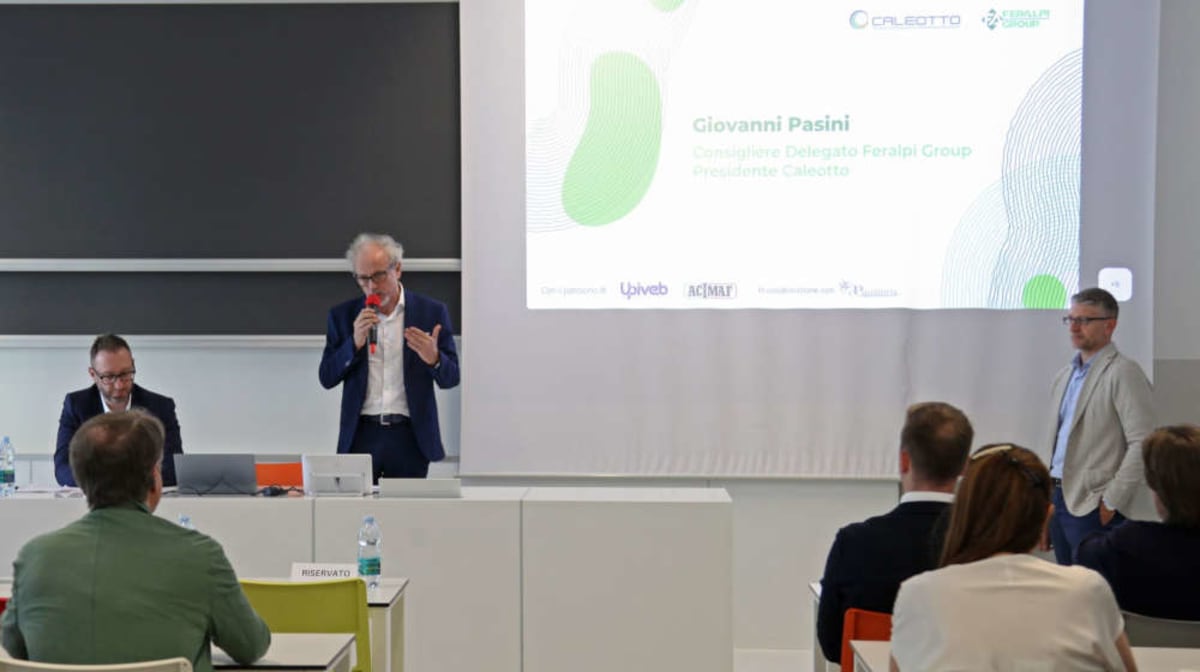Sustainability and circularity in the steel industry: Caleotto's deep dive

Sustainability and carbon footprint reduction were the focus of a recent seminar held on June 26 at the Politecnico di Milano's Lecco campus, promoted by Caleotto and Feralpi Group in collaboration with ACIMAF, Upiveb, and Aequilibria.
The event, titled "Countering Climate Change: What is Carbon Footprint and the market opportunities," aimed to share with the audience and industry representatives the actions taken by Caleotto and Feralpi to reduce the environmental impact of their activities and promote the circularity of products and by-products.
According to Daniele Pernigotti, CEO of Aequilibria, "Supply chain collaboration is crucial" in the context of sustainability. Many national and multinational companies have already begun imposing constraints or pushing suppliers to reduce their emissions. The first step, in any case, is quantification: "Quantify, reduce, compensate," is the mantra emphasized by Pernigotti; only by measuring their actions can companies embark on a path toward sustainable development.
To delve deeper into the topic, let's quote Giovanni Pasini, CEO of Feralpi Group and President of Caleotto, regarding the group's commitment to sustainability: "Feralpi was the very first Italian company in the steel sector and one of the first in Europe to produce a sustainability report, starting in 2004. We continue to make significant investments in a series of projects aimed at reducing emissions." These interventions include electrification of processes, consumption reduction, and the introduction of a cleaner energy mix, including renewables. "Since 2022, we have focused on Carbon Footprint, quantifying emissions, and certifying processes and products. I hope that many of those present will soon be involved in this journey."
Edoardo Zanardelli, Deputy Director of BU Specialties at Feralpi Group, presented the group's investments in the special steels sector, which the company entered in 2015. He highlighted how the steel industry is undergoing a primarily cultural shift that involves all organizational and productive aspects, including technical, technological, managerial, financial, and commercial. A similar change in direction must involve everyone, from those upstream to those downstream, to achieve truly significant results.
The strengths of Feralpi's sustainable development policy were further discussed during the event by Maurizio Fusato, Head of UTEE (Ecological and Energy Transition Unit) at Feralpi Group. Starting from the raw material, it is worth noting that Acciaierie di Calvisano, a supplier to Caleotto, produces steel billets with a high content of recycled material, ranging from 94.4% to 98%. Feralpi goes further to enhance circularity through various initiatives, including heat recovery for energy generation, reclaiming of non-ferrous metals found in scrap, rolling mill sludge, powders, and fumes. But that's not all: the company also creates new, certified, and highly sought-after products from slag. The Greenstone obtained from black slag becomes a substitute for gravel; then there's Greenlime derived from white slag and Greeniron from the reuse of scale from rolling mills. All these once discarded materials regain value and re-enter the market, following the virtuous principles of the circular economy.
During the seminar, Marco Cibien, General Manager of UPIVEB, the national association of fastener manufacturers, also spoke about sustainability: "Our industry is undergoing a cultural revolution, and associations like ours must increasingly become service providers capable of supporting companies in addressing the energy transition and sustainability-related issues."
Ferruccio Bellina, President of ACIMAF (Association of Wire Machinery Manufacturers), was also present at the event and stated, "We are pleased that Caleotto and Feralpi have brought this issue to the forefront. Climate change can have fatal consequences, and the fight against this phenomenon is of paramount importance. To achieve the goals of climate neutrality by 2050, everyone's commitment is essential, starting with raising awareness in the community."
Is what has been implemented so far in line with customers' needs? How urgently are green products truly being demanded? Is the market ready to recognize a higher price for decarbonized products compared to conventional ones? These are some of the key questions that steel industry users are called upon to answer. "We need to understand the needs of the entire supply chain," stated Giorgio Motta, Sales Manager at Caleotto, in closing the conference, "to promote environmental sustainability policies capable of creating value chains for our entire sector."
- Wire rod •
- Round wire rod •
- Half-round wire rod



